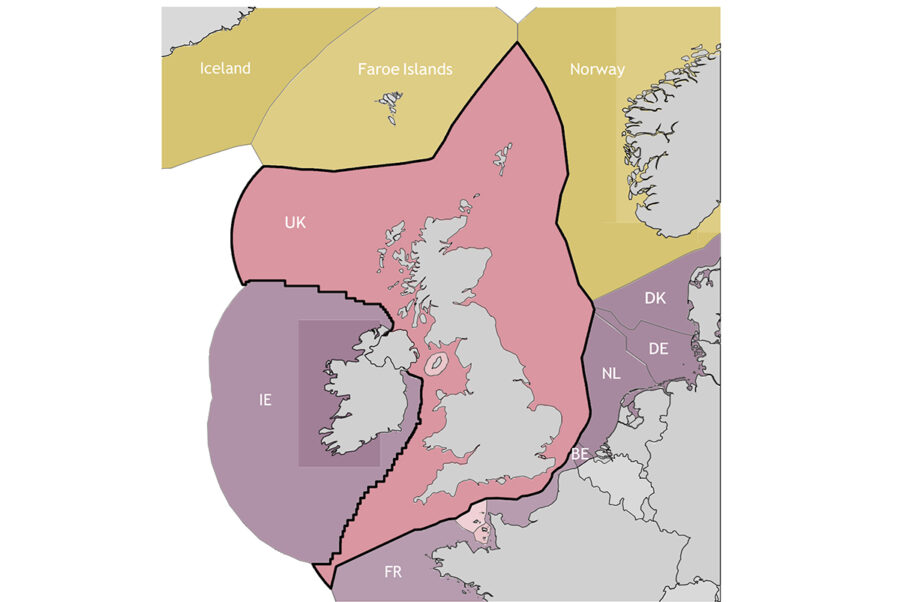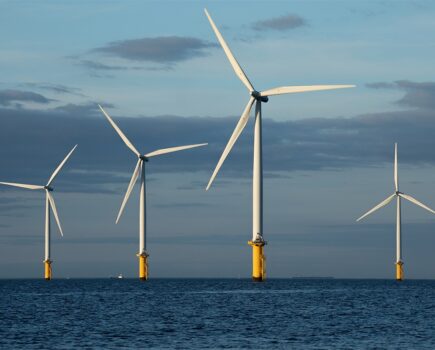Lords report: ‘Expectations may be hard to deliver’
A new Parliamentary report on Brexit and Fisheries says the government faces ‘a huge challenge’ to achieve a successful outcome to the Brexit negotiation on fisheries, reports Tim Oliver.
Above: Map showing relationship between different boundaries used under national and international obligations at a UK scale (2014): Based on Joint Nature Conservation Committee. The UK EEZ is adjacent to six EU countries: Ireland, France, Belgium, the Netherlands, Germany and Denmark, as well as non-EU countries such as Norway and the Faroe Islands and non-exclusive high seas.
Lord Boswell, chairman of the House of Lords EU Select Committee that produced the report said the forthcoming talks would be probably ‘the most important peacetime negotiations in our history’.
The report covers all aspects of the opportunities and challenges Brexit will mean for fisheries. It warns of the dangers of fisheries being marginalised in the Brexit negotiations because the industry is such a small part of the overall UK economy.
It says the Brexit vote ‘has raised expectations for the future of fisheries policy that may be hard to deliver’. While the UK will be able to develop a domestic fisheries policy and control fishing activity within its EEZ, continuing co-operation with the EU and other neighbouring states will be ‘crucial’ to the sustainability of shared stocks.
It says the UK will be able to negotiate new quota shares and to withhold access to fishing in UK waters as a bargaining tool for achieving increased allocations.
But, it says, the government may come under pressure to balance this potential for more quota ‘against the need for continued trade in fish with the EU, while also seeking to develop new frameworks for managing a shared and vulnerable resource. The government faces a huge challenge in seeking to achieve a successful outcome to these negotiations’.
The report highlights the dangers of fisheries being a low priority in the negotiations because of the industry’s relatively small contribution to the overall economy – it is less than half of one percent of gross domestic product (GDP). But it stresses the significance of the fishing industry to many coastal communities and urges that the industry ‘must not be marginalised in the wider Brexit negotiations’.
“Fisheries policy is a complex area, which cannot be solved in its entirety by the Great Repeal Bill. Untangling UK fisheries from the EU will be challenging and require political will and resources, both in the wider Brexit negotiations and beyond,” says the report.
The committee highlight that under international law the UK will have the right after Brexit to control who fishes within its EEZ. The report makes clear that leaving the CFP is an opportunity to develop regulations that are “tailored to the UK”.
But the UK will continue to be under international obligations to co-operate with neighbouring states where stocks are shared between the waters of two or more countries. ‘Fish do not recognise political borders, and most commercial fish stocks are shared between UK waters and those of other EU or European coastal states’.
TACs and quotas
The report also says TACs and quotas should continue, and be based on scientific advice and that ‘the UK should not discard the positive elements of the CFP that successive governments have worked hard to achieve’.
The Committee found that 499,000t of the 666,000t of fish produced in the UK in 2014 (caught and farmed) were exported, and 66% of the exports went to the EU. The UK also imported 721,000t of fish, 32% of which came from the EU. “If the UK fishing industry as a whole is to thrive post-Brexit, it will need to continue to have access to EU markets,” says the report.
The report also stressed the need for the UK ‘to act as a single coastal state’ during the negotiations, and for devolved administrations ‘to ensure that a unified UK negotiation position on fisheries and Brexit is formed’.
Under its own EEZ, the UK would be able to control the access that foreign vessels have to UK waters. ‘It will be for the government of the day to decide whether the principle of equal access should be preserved, and the extent to which foreign vessels should be granted access to fishing in the UK EEZ’.
To exclude foreign vessels, including those claiming historic access, the UK would have to use the full TAC in its EEZ, and under international law would have to co-ordinate with neighbouring states.
The report also points out that ‘quota-hopping’ by flag ships is possible because of EU Freedom of Establishment rules, rather than because of the CFP. ‘Whether the practice is maintained post-Brexit is likely to be determined in the course of the negotiations on withdrawal’.
Commenting on the report, Lord Teverson, chairman of the House of Lords EU Energy and the Environment Sub-Committee, said: “The UK fishing industry relies heavily on trade with the EU. Brexit will involve many trade-offs, and it may very well be that EU member states demand more access to UK waters than some fishers would want, in return for our continued rights to sell fish to the European market with zero tariffs.
“What we are absolutely clear on is that the fishing industry and the coastal communities who rely on that industry should not be overlooked, and must be fully consulted. While fisheries is a relatively small part of the UK economy, it is of fundamental importance to a great many people in different parts of the UK, from Brixham to Grimsby and Newlyn to the Shetlands. Those voices must be heard in the negotiations.”
The committee received oral and written evidence from a wide range of industry leaders and organisations, ministers, officials, academics and NGOs.
Read more from Fishing News here.








